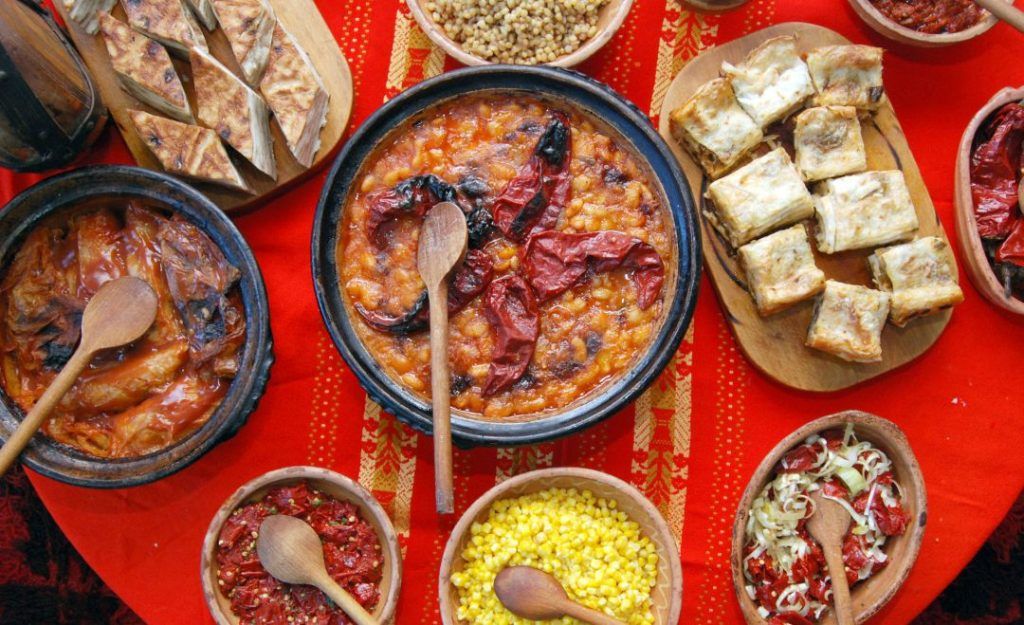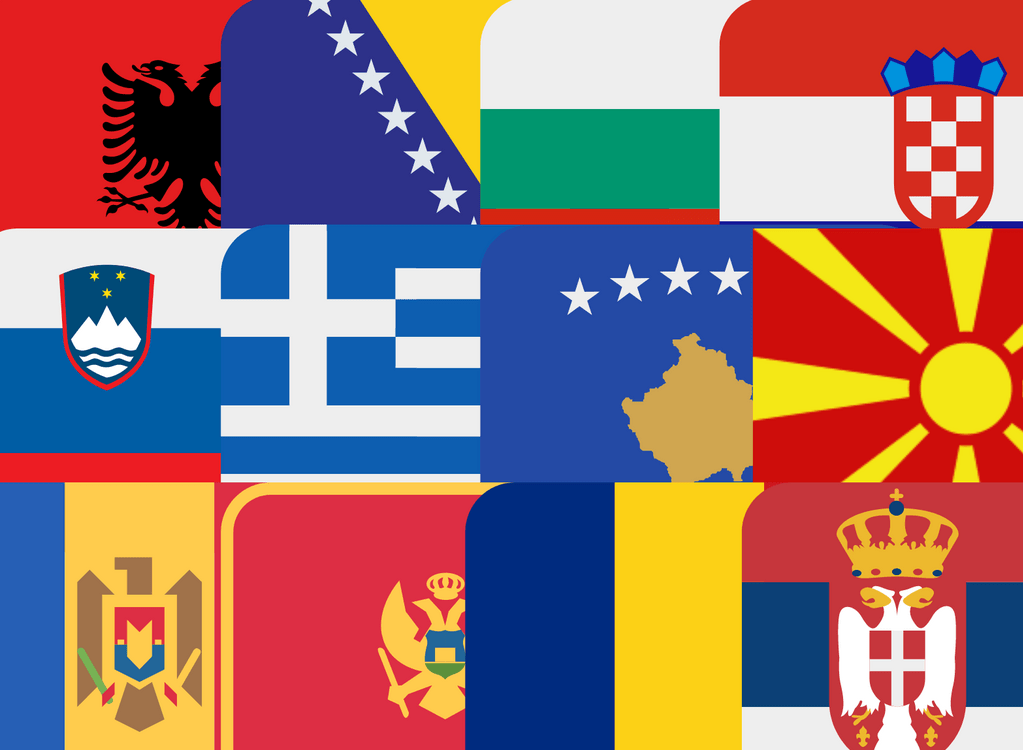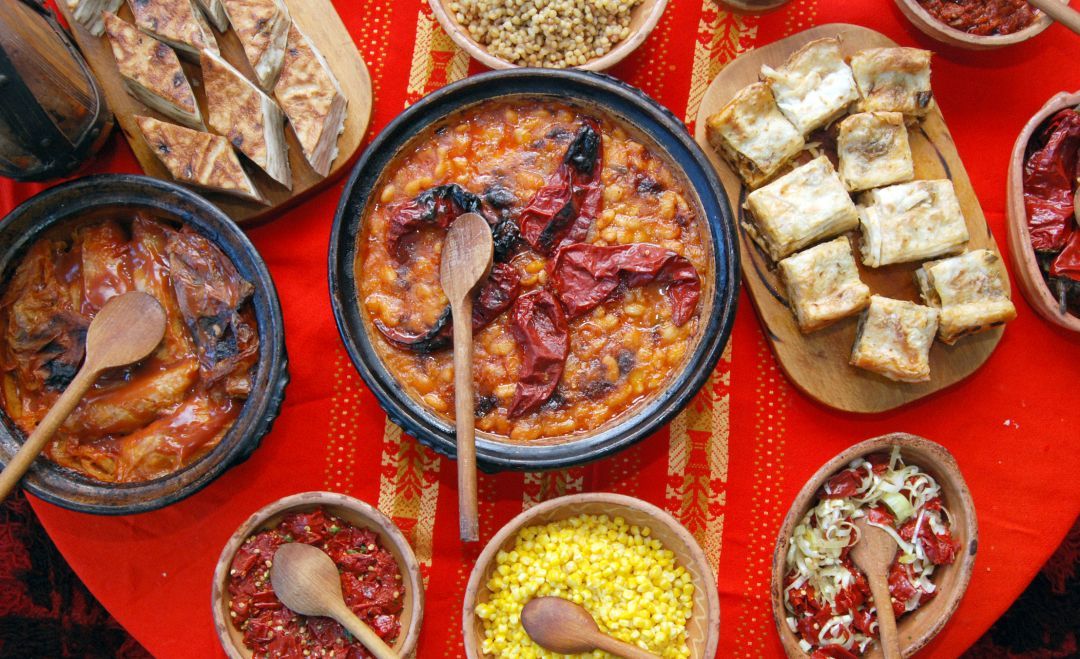The Balkan Peninsula, located in southeastern Europe, is a crossroads where cultures, traditions, and flavors converge. Its cuisine is a true reflection of this diversity, offering a fascinating array of dishes that tell the stories of Ottoman, Slavic, and Mediterranean influences. Each Balkan country showcases a unique culinary style, yet common elements unite the region under a shared gastronomic identity.

Signature Dishes of Balkan Cuisine
Ćevapi
Originally from Bosnia and Herzegovina, ćevapi are small, grilled sausages made from minced beef or a blend of meats, seasoned with spices. They’re traditionally served with flatbread, chopped onions, and ajvar—a savory roasted red pepper spread. This dish has become a symbol of Balkan hospitality and is a staple at festivals and family gatherings throughout the region.
Moussaka
Moussaka is a classic casserole made with layers of eggplant, ground meat, and creamy béchamel sauce. While Greek moussaka highlights eggplant as its main ingredient, variations across Bulgaria and other Balkan countries often include potatoes. This beloved dish reveals the lasting influence of the Ottoman era and demonstrates how local recipes adapt to available ingredients.
Burek
Burek is a savory pastry made with flaky phyllo dough and filled with meat, cheese, or spinach. A popular choice for breakfast or as a quick snack, it can be found in bakeries and street markets across the Balkans. Its roots go back to Ottoman times, and its widespread presence today is a testament to the region’s shared history.
Pljeskavica
Pljeskavica is a flavorful patty made from seasoned minced meat, sometimes stuffed with cheese or ajvar. Served in flatbread with toppings like onions, lettuce, and sauces, this Serbian specialty is a true celebration of the region’s passion for grilled meats and inventive culinary spirit.
Sarma
Sarma consists of cabbage leaves stuffed with ground meat and rice, slowly simmered in tomato sauce. Traditionally served during celebrations and special occasions, this dish’s preparation may vary slightly from country to country, reflecting the unique cultural nuances of each nation.
Gibanica
Gibanica is a savory pie made with layers of phyllo dough and a rich filling of fresh cheese, eggs, and sometimes spinach. It is a festive dish often served at special events, showcasing the region’s skill in creating delicate pastries and hearty fillings.
Tavë Kosi
A national dish of Albania, tavë kosi combines roasted lamb with rice and a blend of yogurt, eggs, and flour, all baked together until creamy and golden. It is a perfect example of the Mediterranean influences that have shaped Balkan cuisine.
Fërgesë
Another Albanian favorite, fërgesë is a comforting dish made from red peppers, tomatoes, onions, and feta cheese, all baked together. Occasionally, meat is added, and the result is a rich, creamy dish enjoyed in homes and restaurants alike.
Speca të Mbushura
Stuffed peppers are popular across the Balkans. In Albania, they are made by filling peppers with a mixture of rice, meat, and spices, then baking until tender. This dish highlights the Ottoman legacy in regional cooking.
Qofte
Qofte are Albanian meatballs, typically prepared with lamb or beef and blended with herbs and spices. Served with tomato sauce or yogurt, these meatballs are a favorite both at home and in eateries across the region.
Bosanski Lonac
Bosanski lonac is a traditional Bosnian stew layered with meat and vegetables, then slow-cooked in a deep pot. This hearty dish has been enjoyed by both the wealthy and the working class for centuries, adapting to whatever ingredients are available.
Malidzano
Malidzano is a traditional North Macedonian spread made with eggplant, sirene cheese, walnuts, and seasonings. Served as an appetizer with bread, it perfectly illustrates the Mediterranean character present in much of the region’s cuisine.
Baklava
This beloved dessert is found throughout the Balkans. Baklava features layers of phyllo pastry filled with nuts and soaked in syrup or honey. With origins tracing back to the Ottoman Empire, each country puts its own twist on this classic sweet treat.
Rakia
While not a dish, rakia is the iconic fruit brandy of the Balkans, made from fermented fruits such as plums or grapes. Commonly served during celebrations, rakia is a symbol of hospitality and an integral part of local culture.
Balkan cuisine is truly a reflection of the region’s rich history and diverse cultural tapestry. Each dish tells a story, and together they form a culinary mosaic that invites exploration and enjoyment.
If you’re planning a trip, don’t miss our article on the top must-see places to visit in the Balkans.
Gastronomic Festivals in the Balkans: Celebrating Flavors and Traditions
Good Food Festival in Dubrovnik, Croatia
Every year, the city of Dubrovnik becomes the heart of Croatian gastronomy during the Good Food Festival. This week-long event features a wide range of activities, including culinary workshops, wine tastings, and presentations by both local and international chefs. One of the festival’s highlights is the “Dubrovnik Table,” a massive table stretching along the city’s main street, where visitors can sample an incredible variety of traditional dishes prepared by local restaurants. It’s an unmissable experience for anyone who wants to dive into Croatia’s authentic flavors.
Truffle Festival in Motovun, Croatia
In the Istria region, the picturesque village of Motovun hosts the annual Truffle Festival, a celebration dedicated to this prized delicacy. During the event, attendees can join truffle-hunting excursions, watch culinary demonstrations, and taste a range of dishes made with both black and white truffles. The festival highlights the importance of truffles in local cuisine and their economic significance for the region.
Food Expo Balkan in Belgrade, Serbia
Belgrade is home to the Food Expo Balkan, an international fair that brings together producers, distributors, and food enthusiasts from all across the Balkans. The event showcases a broad spectrum of food products, from dairy and meats to baked goods and beverages. Seminars and workshops on the latest trends in the food industry make this expo a key platform for knowledge exchange and for promoting the best of Balkan cuisine.
Guča Trumpet Festival, Serbia
While the Guča Trumpet Festival is world-famous for its music, it is also a vibrant celebration of Serbian culture and gastronomy. Throughout the festival—which attracts hundreds of thousands of visitors—you can savor traditional Serbian dishes like ćevapi, sarma, and kajmak, all accompanied by the beloved local drink, rakia. The festival’s combination of lively music and authentic food creates an immersive experience in Serbian culture.
National Folklore Festival of Gjirokastra, Albania
Every five years, the city of Gjirokastra in Albania hosts the National Folklore Festival, an event that showcases the country’s music, dance, and culinary heritage. Visitors are treated to traditional performances while sampling classic Albanian dishes such as fërgesë, tavë kosi, and stuffed peppers. This festival is a rare opportunity to experience Albania’s rich cultural and culinary traditions in a historic setting.
Wine Festival in Maribor, Slovenia
The city of Maribor, Slovenia, comes alive each year with its celebrated Wine Festival, highlighting the nation’s winemaking traditions. Festival-goers can participate in wine tastings, tour local wineries, and enjoy dishes perfectly paired with Slovenian wines. The festival also features cultural and musical activities, making it an all-encompassing experience for food and wine lovers.
These gastronomic festivals across the Balkans offer a unique window into the region’s culinary and cultural traditions. Attending these events is not only a chance to taste a variety of authentic dishes but also an opportunity to understand the history and customs that have shaped Balkan cuisine. For any traveler passionate about food, these festivals are an invaluable opportunity to explore and appreciate the diversity and richness that define the Balkans.

